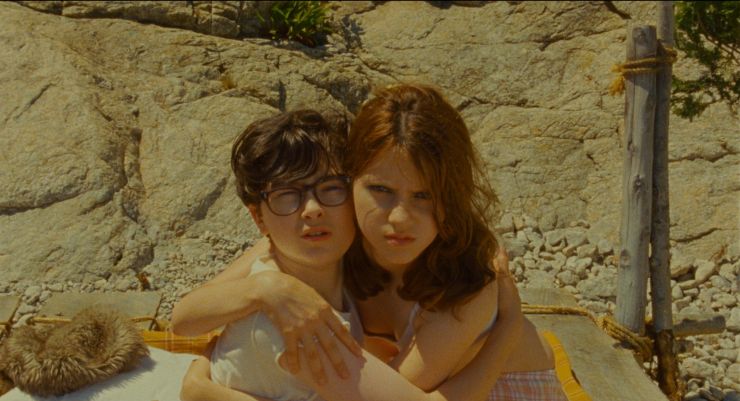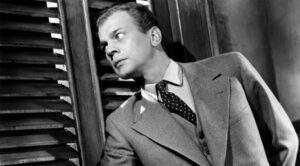![]()
Moonrise Kingdom (2012) Directed by Wes Anderson
It may sound controversial, but Wes Anderson’s exquisitely mystical Moonrise Kingdom transcends the literature from which it draws its inspiration, becoming the closest the quirky American filmmaker has come to transcending the literary format of fables by making them primarily visual, validating their mythological modernization in the audiovisual medium. It is the modern fable that makes all 21st century fables irrelevant, for this and a thousand other reasons, it is Wes Anderson’s quintessential story. Its Bohemian eclecticism can be questioned, yet the argument promptly vanishes when its intermingled stylistic variations testify to one of the richest multidisciplinary combinations of media ever seen in the history of modern cinema. In fact, any antagonistic discussion is irrelevant when the artistic endeavor is so gracefully pure and crafted with so many bona fide ideals that any discrepancy would risk being interpreted as irrational misanthropy. The exhilaration -and not to forget the melancholy- that radiates from the fictional architecture of this story that celebrates life in reciprocity with its most idyllic and tempestuous facets is to be treasured as the optimistic spirit to which you turn when everything in your life seems to lose meaning. Among many of its virtues, its humanistic emphasis seems to be the most evocative; especially considering that the film narrates the noble and incorruptible love of two children with the subtleties of innocent ideals. Interestingly, this is the first Wes Anderson film where the protagonists of his offbeat scenarios are teenagers. Somehow, it was to be expected that the artistic enterprise where Anderson risks the most would assemble all of his postmodern mythology incarnated in two misunderstood lovers in pursuit of an unconquerable utopia. Be that as it may, this is the consummate work of an auteur operating at the pinnacle of his unblemished career. I don’t claim this out of simple and petty demagoguery, taking into account my fanaticism for Anderson. I affirm it understanding that the adulation of a film – masterpiece or not – stems from analytical subjectivity. However, if an auteur’s goals are to transcend his own high standards, then once these are exceeded, it can be objectively asserted that the artist has reached the apogee of his creativity. Here that is exactly what happens, and part of that climactic creativity engulfs Wes Anderson’s philosophy at its most supreme and enjoyable.
This is my favorite Wes Anderson film, and I suspect that has a lot to do with the delicious artsy feast it offers. But more than his good taste in coalescing aesthetics in these generous offerings, what is most pleasurably alluring to me is discovering what those aesthetics are. The broad artistic spectrum of this fable gathers in the most idiosyncratic fashion some of my favorite art forms that I never thought I would see in such miraculous harmony. The range is voluminous, but still discernible, from the metaphorical density of children’s literature on the narrative plane to the pictorial beauty of impressionist art on the visual plane, and if that were not enough, during the apotheosis – in a giddy climax – a deliriously beautiful expressionistic scenario invades the aesthetics of the film, a dazzling sequence that resembles something taken from a silent film of German expressionism. Musicality plays such a pivotal role that the imagery is driven by it and the emotions are felt as musical notes that resonate like the most portentous European operas. And even the eclectic dimensions in this tale are so colossal that its enthralling theatricality runs the gamut from the orthodoxy of classicism to the heterodoxy of modernism. Wes Anderson poured everything he knows into this film, not only does he not limit himself to his copious knowledge of filmmaking, but he steps out of his comfort zone and exploits all the domains constituted in poetics. Bit by bit, the captivating storytelling encompasses Anderson’s career up to this point. Not only is the mischievous immaturity of his early days palpable in the subversive romantic zest that exalts his heroic adolescent dreamers in this story, but it also similarly manifests itself as a reflection of the uncompromisingly anti-tragic ideals that epitomized his output. In conjunction with these aspects reminiscent of Anderson’s early period, there is the maturity and audacity of a formalist filmmaker capable of eliciting poignancy through the tenacity of an ostentatiously artificial formal geometry. Perhaps it gives the impression that every description I give of this film is a deliberate and hyperbolic eulogy to one of the few modern American filmmakers who have won my heart, it is conceivable that this is not even a piece of film criticism – but just as Anderson had the meritorious urge to make cinema as indulgently as possible, I think it is apt that I choose to follow that same sentiment in the semantics of this encomium.
Moonrise Kingdom is one of the most indulgent films in the history of cinema. Simply put, Wes Anderson decides to do his will no matter what kind of narrative anarchy is unleashed in the midst of his functional whims. This may well be the most shambolic narrative structure in his filmography. However, I would like to rephrase that statement, this is the most chaotic but orderly narrative structure in his filmography. It may sound like a laughable oxymoron, but it is not, it is highly rational. The story has major organizational problems, that’s self-evident, yet the visual arrangement is exaggeratedly methodical, thus building a serene symmetry that contains and tames the chaos. Does that make sense? The thrilling fable takes place on the fictional New Penzance Island off the coast of New England in the 1960s. Sam Shakusky (Jared Gilman), an insightful and daring 12-year-old orphaned Scout boy, falls in love with the introverted daughter of a dysfunctional married couple, Walt (Bill Murray) and Laura (Frances McDormand). Both are too preoccupied with their personal lives to notice that Suzy, their alienated daughter, has run away from home with Sam, the boy from Khaki Scout Camp. The genesis of the romantic elopement of these two teenagers madly in love is that of a quasi-spiritual concordance. The remarkable thing about Suzy and Sam’s relationship, played with peculiar charm by both neophyte actors at the time, is that there is no need for prior development. Amidst rhapsodic Wes Anderson-style montages, the immaculate love story unfolds swiftly with ephemeral sequences but doesn’t follow the patterns that are usually prerequisites to make the emotional connection between two protagonists plausible. Anderson and Roman Coppola’s effervescent writing works beautifully, there’s no necessity for narrative superfluity, it’s pure style. Suzy and Sam’s playful interactions of sexual and intellectual self-discovery have more metaphysical congeniality than corporeality, the conversational appears to be unimportant, as the sweet gesticulations and suggestive touches of emotion are more powerfully high-flown than any dialogue. They are guided by careful actions, a kiss on the hand is prettier and more heartfelt than a discursive dialogue that puts those tender acts into words.
The plot initiates with pleasant, warm weather conditions and culminates with the tempestuousness of an inclement storm that allegorizes the Old Testament story of Noah’s ark. Which does nothing but corroborate that this film is a riveting hodgepodge of miscellaneous literature. The atmosphere, be it climatic, photographic or musical perpetually lingers in a mystical aura, that of a fable with as many didactic components as refreshing re-evaluations of Andersonian mythology. No matter what the storyline, no matter how idiosyncratic the characters, Wes Anderson’s oeuvre compassionately deals with characters without paternal figures, or characters with neglectful parental figures. Our Shakespearean protagonists, Sam and Suzy, clearly run away to renounce the burdensome problems of their complicated realities. Once again, the estranged parents with misunderstood children factor converge to establish pathos in a Wes Anderson story, and this factor yields oddball characters unable to fit into the real world. Consequently, the artificiality of the soundstages and the theatrical geometry are justified in serving as distinguishable visual stimuli that mirror the dissonance between the creative realm that the characters pursue versus the real, square, quotidian world that denies them. Consistently, here the splendor of Wes Anderson’s signature style comes into better correspondence with his universal themes; for here each fastidiously symmetrical frame serves a specific purpose – it is definitely more form than content, but the rigorous staging persistently monumentalizes the visual narrative by eschewing frivolity and embracing the Shakespearean romanticism of the characters. The majestic musical accompaniment with compositions by the legendary Benjamin Britten is the final touch, the essential ingredient in the recipe. The ineffable artistry of Wes Anderson’s camerawork has never been more exceptionally coordinated and elegantly balanced than with Britten’s shimmering, angelic score, which is like a character in the film. Moreover, the acting addition of Edward Norton, Bruce Willis and Frances McDormand to the Wes Anderson canon is the coolest thing that could have happened to a film by this American director, whom I am always tempted to call the most European of American directors. You don’t need to learn to love a film like Moonrise Kingdom, you just do. You don’t find masterpieces, they find you. It is the ultimate comfort film, the ultimate coming of age art film, and it is Wes Anderson’s most perfect film.






